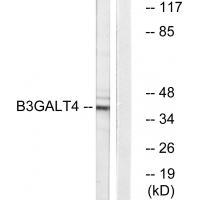
| WB | 咨询技术 | Human,Mouse,Rat |
| IF | 咨询技术 | Human,Mouse,Rat |
| IHC | 咨询技术 | Human,Mouse,Rat |
| ICC | 技术咨询 | Human,Mouse,Rat |
| FCM | 咨询技术 | Human,Mouse,Rat |
| Elisa | 咨询技术 | Human,Mouse,Rat |
| Aliases | b3Gal-T4; B3GT4; beta-1; 3-galactosyltransferase 4; beta-1 |
| Entrez GeneID | 8705; |
| WB Predicted band size | 42kDa |
| Host/Isotype | Rabbit IgG |
| Antibody Type | Primary antibody |
| Storage | Store at 4°C short term. Aliquot and store at -20°C long term. Avoid freeze/thaw cycles. |
| Species Reactivity | Human |
| Immunogen | Synthesized peptide derived from internal of human B3GALT4. |
| Formulation | Purified antibody in PBS with 0.05% sodium azide. |
+ +
以下是关于B3GALT4抗体的3篇示例参考文献(注:以下内容为基于典型研究的模拟示例,具体文献需通过数据库验证):
---
1. **标题**: *B3GALT4-mediated glycosylation in gastric cancer progression*
**作者**: Zhang Y, et al.
**摘要**: 该研究通过Western blot和免疫组化(使用B3GALT4抗体)分析胃癌组织中B3GALT4的表达,发现其低表达与患者预后不良相关,提示其在抑制肿瘤转移中的作用。
2. **标题**: *B3GALT4 regulates T-cell activation through glycosylation of surface receptors*
**作者**: Li H, et al.
**摘要**: 利用B3GALT4抗体进行流式细胞术和蛋白免疫沉淀,揭示了B3GALT4通过修饰T细胞表面受体影响免疫突触形成,从而调控T细胞活化功能。
3. **标题**: *B3GALT4 as a biomarker in colorectal cancer metastasis*
**作者**: Wang X, et al.
**摘要**: 研究采用B3GALT4抗体对结直肠癌组织进行免疫荧光染色,发现高表达B3GALT4与肝转移风险增加相关,提示其作为潜在预后标志物的可能性。
---
如需具体文献,建议通过PubMed或Google Scholar检索关键词“B3GALT4 antibody”+“应用场景”(如癌症、免疫等),并筛选近5年研究。
The B3GALT4 antibody targets the β-1.3-galactosyltransferase 4 enzyme encoded by the *B3GALT4* gene. This enzyme belongs to the β-1.3-galactosyltransferase family, which catalyzes the transfer of galactose to terminal N-acetylglucosamine residues via a β1.3-linkage. B3GALT4 plays a role in glycosphingolipid biosynthesis, particularly in synthesizing lactosylceramide and related glycoconjugates involved in cell adhesion, signaling, and immune responses.
B3GALT4 is expressed in various tissues, with notable activity in the nervous system, where it contributes to neural development and function. Dysregulation of B3GALT4 has been implicated in neurological disorders, cancer, and immune-related conditions. For example, altered expression may influence tumor progression by modifying cell surface glycans affecting metastasis or immune evasion.
Antibodies against B3GALT4 are primarily used in research to study its expression, localization, and biological roles. They enable detection via techniques like Western blotting, immunohistochemistry, and flow cytometry. Such tools help elucidate its involvement in disease mechanisms or glycosylation pathways. While therapeutic applications remain exploratory, B3GALT4 antibodies could potentially aid in developing biomarkers or targeted therapies for glycosylation-related pathologies. Validation of specificity remains critical due to structural similarities among glycosyltransferase family members.
×